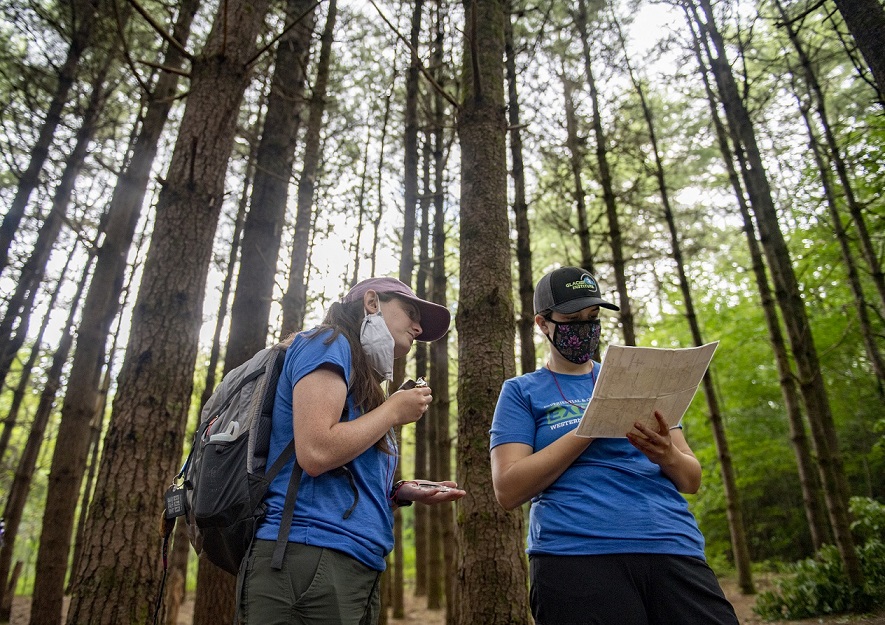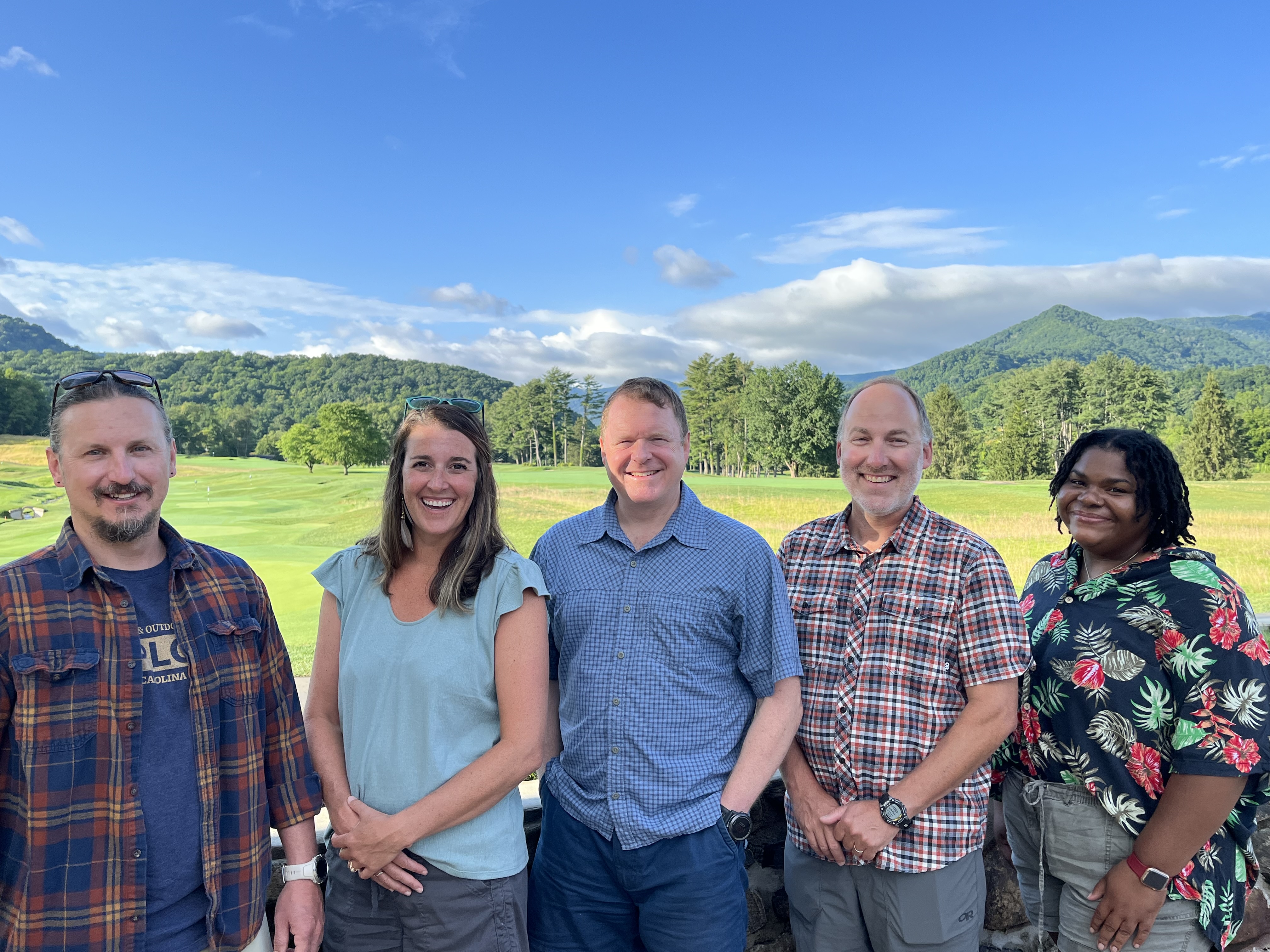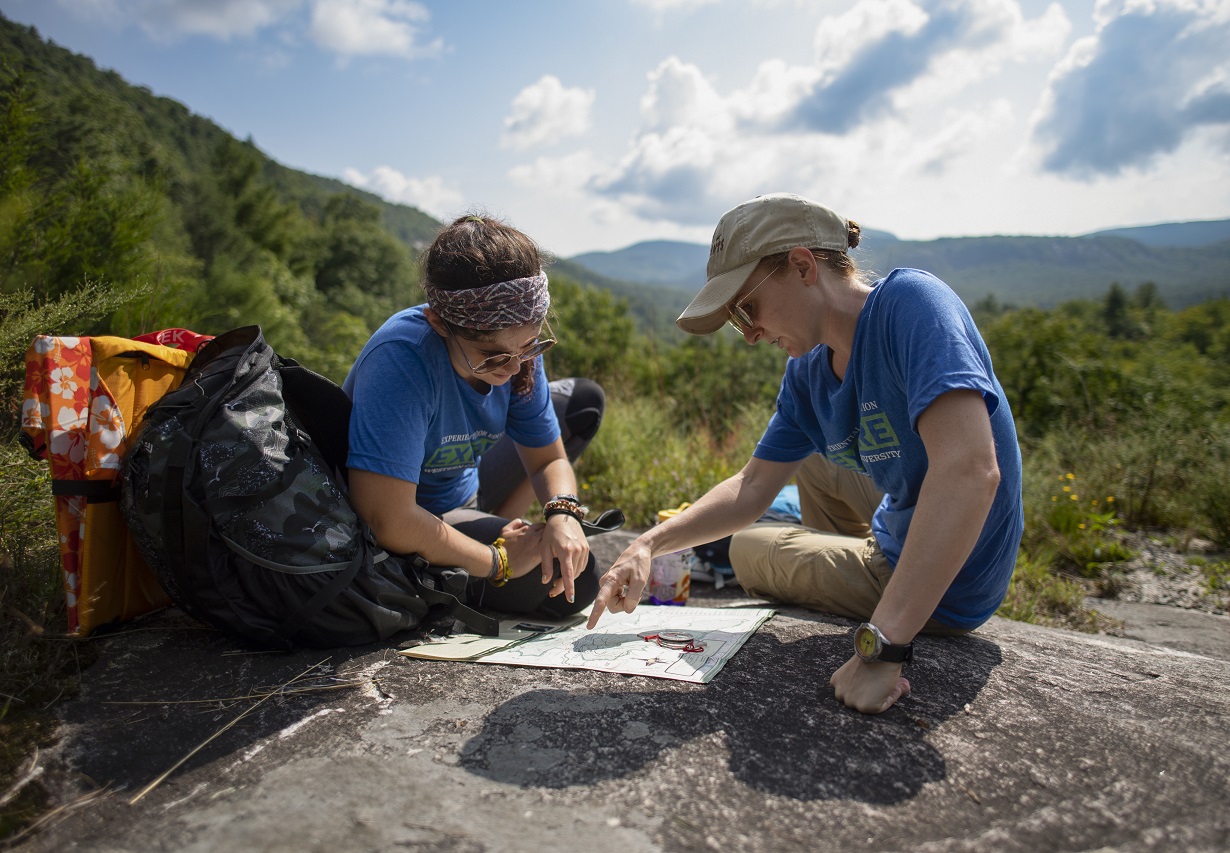- Academic Programs & Support
- Departments, Schools & Colleges
- College of Education and Allied Professions
- Human Services Department
- Experiential and Outdoor Education (EOE)
Experiential and Outdoor Education (EOE)
![]()
M.S. EOE Snapshot
Program Overview
Hybrid: Face-to-face & online
August Start, Full-time Only
15-20 Person Cohort
App Deadline: Priority Feb 1-Final Jun 1
36 Total Credit Hours
Ideal for non-formal educators
Virtual Open House
Thursday, May 2, 2024: 5-6:30 p.m.
Join us at one of our upcoming virtual Graduate School Open House events on Zoom! You'll have the opportunity to learn more about Western Carolina University, understand the Graduate School application process, and meet key program representatives.
About the Program

The M.S. in Experiential and Outdoor Education is a two-year, full-time hybrid program. The degree utilizes the philosophy of experiential education combined with the modality of outdoor education to provide students with necessary training to serve in a variety of educational contexts. This degree works well for a wide range of professionals who work in outdoor and educational programs including: environmental education programs, K-12 public and charter schools, independent schools with an experiential education program, community colleges, university outdoor programs, residential and day camps, therapeutic experiential agencies and camps, and wilderness leadership programs.
Hybrid coursework is a mix of online and face-to-face weekend (Friday and Saturday) core class sessions during Year 1, and elective courses (offered online, face-to-face and hybrid) in Year 2. In the first year, face-to-face coursework will include a 5-day intensive during the first week of classes in August on the Cullowhee campus followed by four weekends each in the fall and spring semesters (8:00AM - 6:00 PM Friday and Saturday with an occasional evening session). The weekend sessions are rotated between the Biltmore Park instructional site in Asheville and the Cullowhee campus. A tentative schedule for the upcoming year can be found in the face-to-face class dates dropdown section.
During the second-year, students will complete additional required and elective coursework (individual choice of face-to-face, online and/or hybrid course formats) including a thesis or project - see examples. This format allows for students to remain employed and/or pursue field-based coursework (e.g. internships) at regional agencies.
Application and Admission Requirements
Start Your Application and Apply Today
If you have any questions, or would like more information, please contact Dr. Andrew Bobilya at ajbobilya@wcu.edu.
Admission Requirements
- Undergraduate GPA of 3.0 minimum (or conditional admission with otherwise exceptional application)
- Bachelor’s degree from accredited institution (or conditional admission pending conferral of degree)
- Strong recommendations from three academic and/or professional sources
- Strong writing skills
- Relevant professional experience and/or goals
Application Documents
- Graduate School Application and Fee
- 3 References
- Essay (see prompts in online application)
- Academic Transcripts
- Work History Resume
Apply Now
Below are directions to the Biltmore Park instructional site and the Cullowhee main
campus, as well as tentative class dates.
Directons to Cullowhee Main Campus
Directions to Biltmore Park Instructional Site
Tentative Spring 2024
(Cohort 4 Face-to-Face; All Day Sessions for EOE 600, EOE 601, and EOE 602)
Weekend 1 – January 19/20 (Cullowhee)
Weekend 2 – February 16/17 (Cullowhee)
Weekend 3 – March 15/16 (Biltmore Park)
Weekend 4 – April 25/26/27 (Biltmore Park) *3 Days
**Cohort 3 Thesis and Project Defenses are March 14 & 15 at Biltmore Park
***Optional elective faculty-led-travel course: EOE 628: Scholarly Writing Intensive
for EOE; Edisto Island, SC; January 20-27, 2024
Tentative Fall 2024 Dates
Cohort 5 Face-to-Face; All-Day Sessions for EOE 500, EOE 501, EOE 502 & EOE 503)
EOE 500 – 5-day intensive (August 19-23) (Cullowhee)
Weekend 1 – September 6/7 (Cullowhee)
Weekend 2 – October 4/5 (Biltmore Park)
Weekend 3 - November 8/9 (Cullowhee)
Weekend 4 – December 6/7 (Biltmore Park)
**Cohort 4 Thesis and Project Oral Proposals are October 2, 3 & 4 at Biltmore Park
Tentative Spring 2025
(Cohort 5 Face-to-Face; All Day Sessions for EOE 600, EOE 601, and EOE 602)
Weekend 1 – January 17/18 (Cullowhee)
Weekend 2 – February 14/15 (Cullowhee)
Weekend 3 – March 21/22 (Biltmore Park)
Weekend 4 – April 24/25/26 (Biltmore Park) *3 Days
**Cohort 4 Thesis and Project Defenses are March 19, 20 & 21 at Biltmore Park
***Optional elective faculty-led-travel course: EOE 628: Scholarly Writing Intensive
for EOE; Edisto Island, SC; January 18-25, 2025
Students will:
- Develop a theoretical and philosophical foundation for experiential and outdoor education.
- Understand research methods as they apply to experiential and outdoor education scholarship.
- Design learning experiences for diverse populations that integrate theory into practice.
- Demonstrate an ability to identify a need in the literature, propose and complete
a graduate level thesis or
project to meet that need.
The Association of Experiential Education defines Experiential Education as: “… a philosophy that informs many methodologies in which educators purposefully engage with learners in direct experience and focused reflection in order to increase knowledge, develop skills, clarify values, and develop people's capacity to contribute to their communities.”
For more complete descriptions of each class, go to the WCU Graduate Course Catalog .
Total credits: 36
Required core credits: 27
Electives credits: 9
Transfer credits are limited to 6 from an accredited university. Additional electives
may be taken from the list below and other WCU Gradute programs.
Note: Counseling electives available for EOE students may change. Contact the Counseling
program for current course offerings. EOE students should contact the instructor for
permission to register. All Counseling courses are offered in a face-to-face format
at the Biltmore Park Instructional Site
| YEAR 1 FALL SEMESTER | YEAR 1 SPRING SEMESTER |
| EOE 500: Foundations of EOE (3) EOE 501: Philosophy & Theory of Experiential and Outdoor Education (3) EOE 502: Diversity and Social Justice (3) EOE 503: Research Methods in Experiential and Outdoor Education (3) |
EOE 600: Advanced Research Methods and Evaluation Techniques (3) EOE 601: Current Trends and Issues in Experiential and Outdoor Education (3) EOE 602: Group Facilitation and Teaching Methods in EOE (3) |
| YEAR 2 FALL SEMESTER | YEAR 2 SPRING SEMESTER |
| EOE 679: Thesis I/Project 1 (3) Elective 1: (3) Elective 2: (3) |
EOE 699: Thesis II/Project II (3) Elective 3: (3) Elective 4: (3) (optional) |
| EOE ELECTIVES |
CURRENT COUNSELING ELECTIVES |
| EOE 620: Introduction to Environmental Education (3) EOE 621: Introduction to Environmental Interpretation (3) EOE 622: Social Theory for EOE EOE 623: Youth Development (3) EOE 624: Social Media, Technology and EOE (3) EOE 625: Experiential and Outdoor Education Expedition (3-6) EOE 626: Interpreting the Natural World for EOE (3) EOE 627: Wilderness Education (3-6) EOE 628: Scholarly Writing Intensive for EOE (3) EOE 630: Outdoor and Sustainability Education: A Pedagogy of Place (3) EOE 635: Sites, Facilities and Programs in EOE (3) EOE 680: Independent Study in EOE (3, R6) EOE 683: Internship in EOE (3, R6) EOE 693: Topics in EOE (3, R9) EOE 799: Continuing Reserach, Thesis (1) |
COUN 612: Sexuality Counseling (3) (Summers) COUN 615: Cross Cultural Counseling (3) (Spring semesters) COUN 617: Addictions Counseling (3) (Spring semesters) COUN 620: Counseling Children and Adolescents (3) (Spring semesters) COUN 693: Topics in Counseling (3) (possibly every semester) |
"Educators working in this field have extremely varied backgrounds. We're excited
that the Experiential and Outdoor Education masters program will provide an opportunity for
educators from across the southeast to expand their skill sets, so they can create
better learning experiences for their students."
Lauren Pyle, Executive Director, Environmental Educators of North Carolina
"This is an exciting development to help prepare the future of the outdoor industry
for the demands of the next generation. WCU is gifted with an amazing faculty, outstanding
natural resources, and a tradition of excellence in training leaders in Experiential
and Outdoor Education. We at Southwestern Community College are proud of our strong
educational partnership over the decades that has allowed our Outdoor Leadership and
Wilderness Therapy graduates to continue their studies at WCU with seamless articulation
to help raise the bar of professionalism in our field. This new graduate program simply
extends that reach to impact graduates to make a difference in their lives and those
of others."
Paul Wolf, Program Director of Outdoor Leadership and Wilderness Therapy at Southwestern
Community College and Chair of Standards of the Association for Experiential Education
Accreditation Council.
"WCU has had wonderful foresight in designing and implementing this new program, at
a time when creative initiatives and leadership development are key components for
a productive economy for our outdoor industry."
Mairi S Padgett, Administrative Director, Landmark Learning
“The new MS in Experiential and Outdoor Education program shows Western Carolina University’s
commitment to continually grow the talent pipeline that supports the outdoor industry
in North Carolina, and across the nation. WCU’s proximity to nationally recognized
outdoor recreation opportunities make it the perfect place to cultivate the leadership
skills necessary for graduates looking to be a driving force in this growing industry.”
Amy Allison, Director,
North Carolina Outdoor Recreation Industry Office
Diversity Statement
Diversity involves the affirmation, understanding, and professional application of
the richness of human differences, ideas, practices, and beliefs that result from,
but are not limited to, age, race, color, disability/health, ethnicity, gender identity,
language, national origin, religion/spirituality, sexual orientation, socioeconomic
status, rural or urban status, as well as the intersectionality of these multiple
identities. Professional practice that is responsive to diversity includes culturally
appropriate communication skills; understanding power differentials and dynamics;
and attending to the social and cultural values which influence the multiple areas
of practice represented in EOE.
Commitment to Social Justice
A commitment to social justice serves as a guiding principle of the EOE Program and
reflects our belief in the values and goals of a socially just society. Socially just
societies are dependent upon the optimal functioning, health, and well-being of all
persons in that society. Optimal functioning, health, and well-being of persons are
contingent upon access to healthy environments that support healthy development and
functioning. Our program is centered on a social justice approach by helping students
to examine power structures resulting in social injustices and to adopt an advocacy
role in working with marginalized and underserved populations. Our goal is to foster
the development of professional advocates who work to change societal structures,
practices, values, and policies which have long served to perpetuate unhealthy environments
for these populations. By working to effect change at the individual, institutional
and systemic level, our students assist in promoting greater access to economic, social,
political, and cultural resources.
How has the M.S. in Experiential and Outdoor Education program at WCU impacted your personal and/or professional life?
“The EOE Program at WCU changed both my professional and personal life in ways I could
not have initially thought possible. This program connected me with a cohort of like-minded,
passionate, and hard-working individuals who became more than classmates. We all encouraged
each other to do our best and supported each other during and beyond our time within
the EOE program. Seeing the growth that we all experienced during the program fills
me with a sense of gratitude and optimism at the potential impact that everyone will
have in our varied fields of work. Regardless of the scope in which my cohort members
find themselves, I believe this program will ensure the progression and growth of
our field in a multitude of ways.”
- Blake C., Recreation Consultant, Recreation Resources Service - NC State University
Why should someone consider attending the EOE program?
“Anyone that wants to grow as an experiential/outdoor educator should consider the
EOE program because of the balance of challenge and support from the faculty. While
I worked as hard on this degree as anything I've ever done, my professors were there
every step of the way. The thesis/project process is scaffolded with progressive coursework
and regular check-ins with your advisor so that you are set up for success.”
- Kyle H., Public School Teacher
Anything else you would like to share about your experience as a student in the EOE program?
I am so grateful for my time in the EOE program. I have made lifelong friends in this
program, developed a strong understanding of how theory can inform my practice as
an environmental educator, and discovered a love for research in this field.
- Alayna S., PRTM PhD Student, Clemson University & Research Assistant, REYSE Collaboratory
Do I have to move to Cullowhee?
No, you do not need to move to Cullowhee. Classes are held both in-person and virtually
in our Cullowhee and Biltmore Park locations. Depending on how a student crafts their
schedule and curriculum, certain electives and courses may fit their location and
commute more easily than others. There are required face-to-face class dates listed
in the drop-down section with the same title that students will need to plan around.
How much is in-person vs. virtual?
Much of the coursework will take place in-person. The amount of hybrid (face-to-face
and virtual) coursework will depend on electives taken. Face-to-face class dates can
be found in the dropdown section of the same title. In the first year, face-to-face
coursework will include a one-week intensive course on campus at the start of the
term followed by four weekends (Fridays and Saturdays) each in the fall and spring
semesters (April weekend is Thursday, Friday and Saturday). Students will be engaged
in online coursework throughout the semester(s). During the second year, students
will complete additional required and elective coursework (individual choice of face-to-face,
online and/or hybrid course formats) including a thesis or project. This format allows
for students to remain employed full-time and/or pursue field-based coursework (e.g.,
internships) at regional agencies.
How much does the program cost?
The cost will depend on in-state vs. out-of-state residency. Information about fees, expenses,
and financial aid.
Is there a thesis requirement or project?
Yes. Students choose between a thesis or project. You may see a sample list of previous theses and projects.
What kind of jobs are graduates going into on graduation?
Many EOE students continue in their current role at their place of employment, advance
to a new position at their place or employment or change jobs. EOE students currently
serve as K-12 public and private school educators, state and national park rangers,
summer camp staff, nature center and environmental education center staff, college
and university campus recreation professionals and more.
How flexible is the curriculum?
During the first year, everyone takes the same core EOE classes. During the second
year, students choose a minimum of three electives (no maximum) that can be online,
hybrid, or face-to-face in addition to the thesis/project courses (EOE 679 & EOE 699)
Do I have to be an outdoor-pursuits person? Do I need prior experience camping, or
be a wilderness/adventure expert?
No, you do not need to be outdoor-oriented or have that kind of experience in this
program. This program does not have any core required classes that integrate overnight
camping trips. We welcome applicants with all levels of skill and experiences who
have an interest in experiential and outdoor education.
Are there any intensive field courses?
There are faculty-lead travel elective courses (such as EOE 627, a wilderness education course) that promote outdoor leadership in a multi-day, expedition
style course.
How does the program support students in writing their thesis/project?
There is a specific class (EOE 628: Scholarly Writing Intensive for EOE) that supports students in writing their thesis/project. Students can also seek support
from professors.
I’m new to Western North Carolina, is there an opportunity to learn more about the
natural history of WNC?
We offer a specific course (EOE 626: Interpreting the Natural World for EOE) that includes information and in-person engagement with our surrounding environment.
We also encourage students to visit places such as the Mountain Heritage Center and
the WNC Nature Center.
Does the EOE program offer graduate assistantships?
Yes, in 10 or 20-hour formats. If you want to be considered for one of these assistantships,
you need to apply by the priority deadline of February 1st. Assistantship duties are
a mix of research, teaching, and service support under the direction of a faculty
member in either the EOE or Parks and Recreation Management (PRM) programs.
Does the EOE program offer scholarships?
The EOE program currently oversees two types of scholarship awards. Applicants must
apply by the February 1st priority deadline. Additionally, the Graduate School of
WCU has scholarships available for which you may apply.
EOE Faculty
 Left to right: Jeremy Schultz, Callie Schultz, Paul Stonehouse, Andrew Bobilya, and
Roslynn Powell
Left to right: Jeremy Schultz, Callie Schultz, Paul Stonehouse, Andrew Bobilya, and
Roslynn Powell

